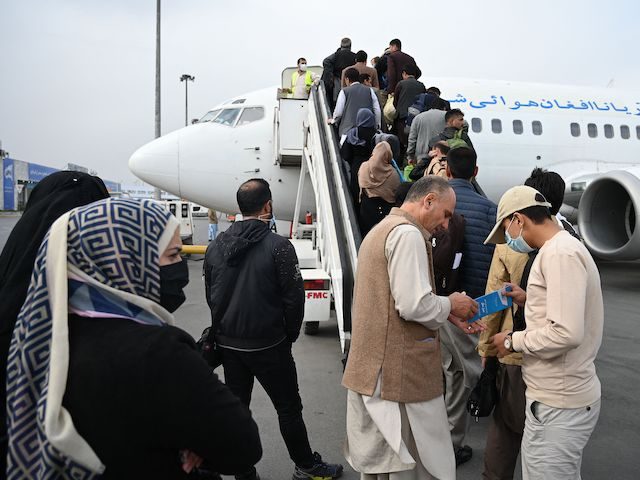Afghanistan’s journalist union revealed on Wednesday that many of its members remain trapped in the country – where the ruling Taliban jihadists group regularly assaults and terrorizes journalists – because of “vast fraud” in which non-journalists bought reporter identification cards on the black market and used them to flee.
Afghanistan’s Khaama Press cited the head of the National Union of Journalists in Afghanistan, Masroor Lutfi, denouncing large numbers of “common Afghans” using false identities as journalists to fast-track their departure from the country in the aftermath of the Taliban’s conquest of the country, completed on August 15. The Taliban’s return to power after 20 years triggered a wave of thousands of Afghans, particularly in the capital Kabul, desperately trying to leave the country, prompting chaos in Kabul’s international airport and confusion for nations attempting to process the individuals seeking asylum.
Lufti denounced not only individuals impersonating journalists, but “non-journalistic bodies” wholesaling the fraud.
“The Union has claimed that non-journalistic bodies in Afghanistan have not only enlisted their close friends and relatives in the evacuation process as Afghan journalists,” Khaama reported, “but have also embezzled a large amount of national and international financial aids.”
“The so-called journalists’ advocates in Afghanistan have never been journalists and they have been utilizing the names of journalists to take out relatives and friends,” Lufti told the outlet.
Even some actual media organizations, Lufti said, are selling fraudulent but authentic media credentials on the “black market.”
“The claim comes as hundreds of Afghan journalists are still working on the ground and have received no support and aid from the international community,” Khaama noted, “while hundreds of others have been taken out utilizing the names of journalists and holding fabricated documents.”
Taliban jihadists insisted they would respect the right to a free press – within their brutal interpretation of sharia, or the Islamic law – in the immediate aftermath of their return to power.
“We will respect freedom of the press, because media reporting will be useful to society and will be able to help correct the leaders’ errors,” Taliban spokesman Zabihullah Mujahid told Reporters Without Borders (RSF) two days after the Taliban siege of Kabul. “Through this statement to RSF, we declare to the world that we recognize the importance of the role of the media.”
At a press conference some days later, Mujahid added conditions to his promise.
“The media should not work against national values, against national unity. When it comes to ethnic differences, religious differences and hostilities, they should not be actually promoted by the media,” Mujahid told reporters during his first-ever press conference, “they should work on the country for the unity of the nation to have peaceful brotherly living together.”
Mujahid also demanded that all media uphold “Islamic values,” without elaborating.
In reality, the Taliban rapidly moved to censor journalists it deemed incompatible with its vision for the country, particularly women journalists who the terrorists banned from entering their offices or leaving their homes at all. Reports on the ground in August indicated that roving Taliban terrorists were going door-to-door, visiting media organizations and imposing their moral code on their coverage.
“For many years, I worked as a journalist … to raise the voice of Afghans, especially Afghan women, but now our identity is being destroyed and nothing has been done by us to deserve this,” a woman news anchor told the U.K. Guardian. “In the last 24 hours, our lives have changed and we have been confined to our homes, and death threatens us at every moment.”
Journalists reported violent visits in which Taliban jihadists killed or viciously assaulted known journalists. In one particularly violent incident, Taliban terrorists attacked two journalists with newspaper Etilaat Roz, Nematullah Naqdi and Taqi Daryabi, after they planned to cover an anti-Taliban protest organized by women.
“One of the Taliban put his foot on my head, crushed my face against the concrete. They kicked me in the head… I thought they were going to kill me,” Naqdi told the Agence France-Presse (AFP).
Taliban senior spokesmen, as they have done in response to nearly every embarrassing incident to their name, denied that the Taliban leadership had greenlit assaults on journalists and claimed to organize a task force to “address media problems” in late August.
“In order to prevent violence and harassment against journalists, we announce the formation of three-member committee,” Mujahid said at the time.
The committee has yet to publish any meaningful results of investigations or hold anyone accountable for the attacks it is allegedly investigating.
The Taliban took over Afghanistan on August 15 after launching a nationwide campaign to eradicate the former government of the country – a campaign that was largely bloodless as many Afghan soldiers simply refused to fight, fleeing across the Tajik border or joining the Taliban. Taliban jihadists had largely ceased attacks on foreign forces after inking an agreement with the government of former American President Donald Trump last year that guaranteed the exit of American troops from the country by May 1, 2021. Current President Joe Biden violated the agreement, prompting the Taliban to attack.
Biden’s plan – to withdraw by September 11, which he also walked back – resulted in the unplanned mass evacuation of largely unidentified people from Kabul in August. At the time, widespread reports from people on the ground indicated that endangered journalists were among the many left behind to the Taliban – including journalists with U.S. government agencies like Voice of America. Some journalists with American outlets like the New York Times escaped with the help of foreign countries like Mexico, as the Biden administration offered insufficient support.

COMMENTS
Please let us know if you're having issues with commenting.